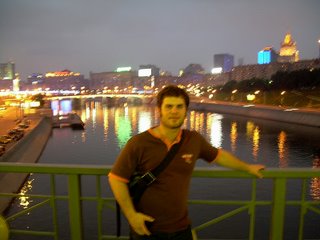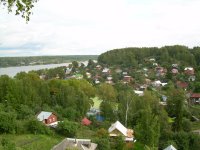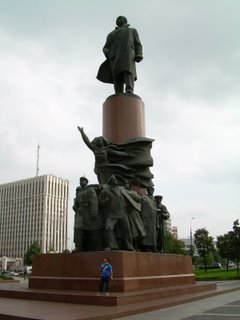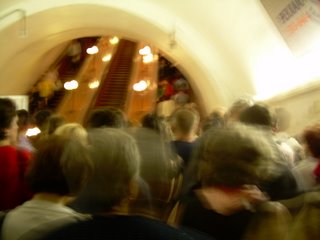On our last night in Moscow we had a "closing reception" for our "orientation," which consisted of snackfood and wine at the American Center in the main library in Moscow. There were only about ten people there that were not directly linked to our program (including the American Center staff). After a speech or two, we were instructed to mingle with the non-Fulbright guests. Two other Fulbrighters and I ended up in a conversation with an American diplomat who had been in Moscow for only seven weeks and, as far as we could tell, had no specialty either in Russian language or culture. He proceeded to impress upon us how different a Russia we were going to be in than the Russia of cold war days. I briefly said something inane about the difficulty of understanding the cold war as seen through its impact on the daily lives of Americans, given that as a youngin' I only read about big events like McCarthyism, Cuban Missile Crisis, Bay of Pigs, etc. His response was to go into a bit of a tirade against "intellectuals" who compare events in the West like McCarthyism to the atrocities of Stalinism. I could not help myself, and had to point out that a better comparison would be with the number of civilians killed by right wing dictatorships propped up by the U.S. via the CIA over the last century. Given, such a tally is not easily available, and would probably be still quite a bit smaller than the number of people killed by Stalin's purges. However, it does complicate the post hoc analysis of the cold war.
In any case, the diplomat kept repeating his central point, that "those were ideological times," when it meant "if you don't agree with my ideology, I'll kill you." Indeed, the cold war and World War II were about ideology. But what is the Iraq war about? I asked him. He said, "that is really more of a traditional war to protect our country's interests." I'm not sure what that means. The sense I get is that, despite this man's extensive travel, he still uses the word "ideology" the way the words "terrorist" and "nationalism" are used; i.e. to signify the wrong-headedness of members of an 'other' culture. We are not "Ideological," we are "protecting our own interests" which are of course well grounded in "Reality." We are simply involved in a "conflict" to protect homeland, as any "patriot" would do. They are "idealogical," "nationalist" "terrorists." It is a linguistic trick that delegitimizes the recipient of the adjective without need for any complicated argument or reasoning.
This, of course, is not new. But, it was especially disturbing coming from a diplomat, someone who obviously has seen much of the world. It bothered me, in particular, because it indicated to me the extent to which I must be seeing everything here through biased eyes, despite my best efforts to identify those biases.
In an earlier post, I wrote that Russia's is a history of "what if's?" What country does not have so many turning points in its history, which one may wish had been a turn to a different direction? What if JFK had not been shot? What if Nixon had been put on trial? What if the Supreme Court had not stopped the recount in 00? And so on and so forth.
So much is different here, it is easy to forget how much is the same. I look at the crazy lay-out of Samara, which I recently described in an email to a friend:
"It's old and tiny decrepit buildings, its mess of small dusty streets. The green that seems to grow in the small spaces which the central planners forgot to include in their machinations. It could be any city in Russia, I think. A thin clutter of advertisements spewing into the streets, collecting into small shopping centers that look new and western, here and there. The rest of the city is old. It's been this way probably for a hundred years. There are the big Soviet, apartment buildings (my dorm is one of them), but mostly the central part of the city is composed of these old one- and two-floor wooden buildings, with the decorative, carved window dressings."
It could be any city in Russia. But, it could also be Oxford Mississippi. The disjointed mixture of old and new is not unique to Russia. The large Soviet apartment block buildings look not unlike the projects of every American city built in the sixties and seventies. The green growing in seemingly random, chaotic sprawls. Does that not happen in every city to some extent?
Indeed, Russians are poorer than Americans, this is true. And the state has certainly had a different role in society in the last century. However, many things, I'm sure, must be the same. This is perhaps why I'm here. To see what sticks when I turn everything around, and look at it from a different angle.
I simply hope that I succeed in doing just that, and not seeing simply a different, 'other' world, the kind that might require its own separate lexical categories.








